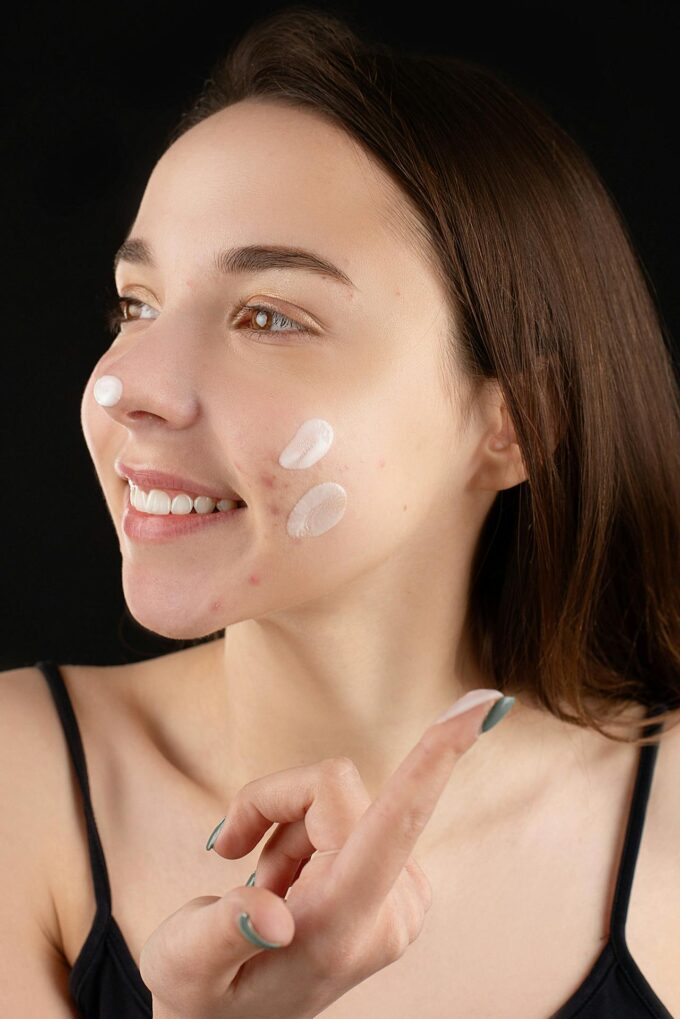
Photo by Anna Nekrashevich
Key Takeaways
- Recognize the underlying causes of acne.
- Find out about lifestyle modifications and natural therapies that can manage acne.
- Make dietary adjustments to promote healthy skin.
- Learn about the advantages of using natural skin care products and techniques.
Understanding Acne: Causes and Triggers
Acne is a common skin condition that affects people of all ages, from teens to adults. It happens when dead skin cells and grease clog hair follicles. Hormonal changes, especially in puberty, cause a rise in androgen hormones, increasing oil production and clogging pores. This illness is made worse by genetic susceptibility, stress, and poor food. Comprehending these underlying reasons and employing appropriate treatments are necessary for addressing acne holistically. For instance, a product such as an acne dark spot treatment helps address and reduce particular skin issues, such as post-inflammatory hyperpigmentation.
Overall, leading a healthy lifestyle that includes stress management, a balanced diet, and regular exercise can significantly enhance skin health and decrease acne breakouts. Seeing a dermatologist for individualized treatment strategies can be quite helpful, particularly in severe or chronic acne cases.
Natural Remedies to Combat Acne
To properly treat acne without suffering from the unpleasant side effects that are sometimes connected with chemical therapies, many people have resorted to natural solutions. Tea tree oil, honey, and aloe vera are popular ingredients because of their inherent antibacterial and anti-inflammatory qualities. For example, tea tree oil is highly praised for its capacity to combat microorganisms and lessen inflammation. Redness and swelling in afflicted regions can be significantly reduced by applying a small amount of tea tree oil. Because of its antimicrobial qualities, honey can relieve and lessen pimples. Aloe vera, on the other hand, encourages healing and helps soothe sensitive skin.
Lifestyle Changes for Clearer Skin
Topical medications might not be enough to treat acne properly; lifestyle adjustments are essential. Establishing and following a daily skincare routine is essential. To start, cleanse your skin gently to remove makeup, oil, and pollutants while preserving its natural moisture content. Next, use salicylic acid or benzoyl peroxide to address acne and a non-comedogenic moisturizer to moisturize the skin. Avoiding heavy makeup is crucial, as it can clog pores. Choose lightweight, non-comedogenic products that enable the skin to breathe properly. Ensuring your makeup brushes and applicators are clean can also help stop acne-causing bacteria from spreading. Drinking sufficient water helps keep skin moisturized and plays a crucial role in managing acne. Consistent physical activity improves blood flow, enhances skin condition, and maintains hormone levels. It is essential to clean the skin after working out to eliminate sweat and bacteria that can lead to skin problems.
The Role of Diet in Acne Management
Your skin’s general health can be significantly impacted by the type of diet you eat. Maintaining good skin is facilitated by eating a diet high in fruits, vegetables, lean meats, and nutritious grains. Antioxidants and vitamins in leafy greens, berries, and almonds can help reduce oxidative stress and inflammation. High-glycemic meals and dairy products are examples of foods that can exacerbate acne. Milk and other dairy products include hormones that may be linked to acne problems. Foods high in glucose can increase blood sugar, increase oil production, and worsen inflammation. According to research, eating a low-glycemic diet can lessen acne’s severity. Complex carbs in quinoa, veggies, and legumes help control blood sugar levels and lessen acne. Omega-3 fatty acids have anti-inflammatory qualities.
Benefits of Natural Skincare Routines
People with sensitive skin or skin prone to acne may benefit most from using skincare products made of natural ingredients. These products are less likely to have harsh chemicals or synthetic perfumes that aggravate acne by irritating the skin. Natural materials are kinder to the skin and may provide more gentle solutions for common skin issues. For example, the natural astringent witch hazel tightens the skin and lowers inflammation to help treat acne. Green tea extract, high in antioxidants, has anti-inflammatory properties that soothe and protect the skin. Niacinamide is a form of vitamin B3 that improves the skin’s barrier function and reduces redness and inflammation.
Incorporating Natural Ingredients into Your Routine
When looking for skincare products, choose natural ingredients known to help treat acne. Salicylic acid in willow bark gently exfoliates the skin to remove dead skin cells and unclog pores. Witch hazel acts as a toner to minimize pores and reduce oiliness. Serums and moisturizers with green tea extract and niacinamide have anti-inflammatory properties and can improve skin texture. Introducing new products gradually and monitoring how your skin reacts is essential. Patch testing a small area of your skin before using new products can help prevent adverse reactions. Using these organic ingredients in a consistent skincare routine can significantly improve acne control.
Making It Sustainable: Long-Term Acne Management
Maintaining consistency is essential for treating acne. Follow a daily skincare regimen, and remember that it could take some time to see benefits. As was previously mentioned, eating a balanced diet should also be part of your long-term strategy for keeping clear skin. Besides the daily routine, other sustainable practices include regular monitoring of your skin’s response to different treatments. Over time, you may need to adjust your skincare products or routine based on how your skin evolves. Staying informed about skincare and continuously educating yourself can also empower you to make better choices for your skin health.
Conclusion
Successfully managing acne requires a comprehensive approach that encompasses understanding its causes, making lifestyle and dietary changes, and choosing the right skincare products. Integrating natural remedies and maintaining a consistent routine can improve skin clarity. Patience and persistence are critical, and achieving clearer skin is attainable with the right strategies.














